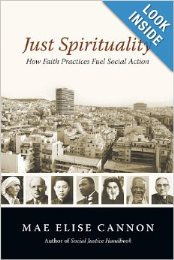
Book Review by Loren Dubberke
Just Spirituality: How Faith Practices Fuel Social Action, written by Mae Elise Cannon, is a book that challenges all those interested in becoming agents of social change in our broken world to recover and integrate the spiritual disciplines into one’s activist lifestyle. Cannon highlights seven faith hero’s of the 20th Century such as Mother Theresa, Martin Luther King and Dietrich Bonhoeffer to illustrate how one’s personal faith and spiritual practices play a vital role in motivating and sustaining transformative leaders over time. The author also points out contemporary examples of faith leaders who are following in the footsteps of these spiritual giants and living out a “just spirituality”.
Many of us are familiar with some of the sacrificial work that has been accomplished by several of the faith leaders mentioned in this book , but most are not aware of the kinds of spiritual practices that shaped and formed them into powerful social reformers. Getting glimpses into the kinds of spiritual practices that they valued opens our eyes to better understand how they were able to persevere in the midst of adversity and remain faithful to their calling.
Today we are bombarded by a slew of social issues and disparities that exist in our world. We hear about the urgent needs through social media and from a variety of news sources. Many people are joining groups and organizations that are fighting injustice or striving for social reform. Poverty, the environment, immigration, homelessness, health care, peacekeeping are a few areas that come to my mind.
As a new generation of practitioners and change agents respond to these growing social issues of our day, several questions arise: What will be the long term impact of these new movements and ministries we are seeing? How will leaders working on the front lines survive and thrive with all the demands that doing social justice ministry requires? How will we discern what issues to tackle when we are presented with so many good causes?
Cannon makes a solid case that justice-oriented movements must be inspired by God and firmly rooted in Christian practices and disciplines for us to be effective for the long haul and finish well. Because this kind of work is emotionally demanding, spiritually exhausting and physically challenging, it is critical for us to cultivate the garden of our souls.
Having Served as a Pastor of Community Ministries for over 10 years in an underresourced neighborhood, I’ve discovered how difficult and overwhelming it can be to see change happen. I desperately need resources and wisdom that transcend human hands and heads. Feelings of frustration, disappointment, grief, and helplessness can quickly dominate our worlds when we walk alongside those on the margins. We are also confronted by our own brokenness as we see it in others. Yet, in the midst of the pain and complexity of participating in social action, God has provided ways for us to maintain our well-being that are like little oasis’s in the desert.
Two of the practices that Cannon expounds on that I identify the most with are the practice of Silence and Sabbath retreats. I try and break away every couple of months for a day or two to step away from the weekly demands of ministry and listen, reflect and refocus. In fact, today, after I finish this review, I am actually heading on a 2 day personal retreat. Once again, it has been a very hectic fall ministry season, so I look forward to these times because I know that they are life-giving. God desires to meet with us, renew us, and change us just as much as we want to see that very change and renewal in the world we work and serve. I’m taking this book with me as a companion.





